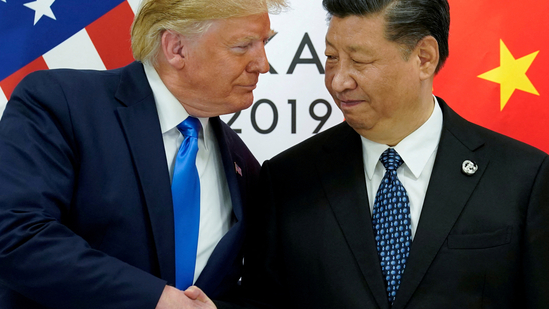US’s strategic asset seizure and rising economic conflict with China
This article is authored by Ananya Raj Kakoti, scholar, international relations, Jawaharlal Nehru University, New Delhi.
The recent sale of Panama Canal port assets by Hong Kong's CK Hutchison Holdings to a US-led consortium has significantly heightened US-China trade tensions. This transaction, coupled with escalating tariff measures, underscores the deepening geopolitical rivalry between the two economic superpowers.

On March 4, 2025, CK Hutchison Holdings announced the sale of its stakes in the Balboa and Cristobal ports—strategically located at the Pacific and Atlantic ends of the Panama Canal—to a consortium led by BlackRock Inc. for approximately $22.8 billion. This deal also includes control over 43 ports across 23 countries, marking a significant shift in global port operations.
The Panama Canal is a critical maritime route, handling about 4% of global trade and over 40% of US container traffic. The canal's significance to global commerce cannot be overstated, making control over its associated ports a matter of strategic importance.
President Donald Trump lauded the acquisition as a strategic victory against Chinese influence in the western hemisphere. He stated, "My administration will be reclaiming the Panama Canal, and we've already started doing it," highlighting the administration's intent to counter perceived Chinese control over critical global infrastructure.
This perspective stems from longstanding concerns about China's Belt and Road Initiative and its investments in global infrastructure, which some US policymakers view as efforts to expand geopolitical influence. The acquisition by a US-led group is seen as a move to reassert American presence in a region historically within its sphere of influence.
The sale has elicited strong reactions from Beijing. Chinese President Xi Jinping expressed displeasure over the transaction, particularly because it proceeded without Beijing's approval. The Chinese government had reportedly intended to use the Panama port as leverage in negotiations with the US, and the unexpected sale disrupted these plans, leading to heightened tensions.
Moreover, Chinese authorities are scrutinizing the deal for potential security risks and antitrust violations. There are concerns that the sale could set a precedent for other strategic assets, potentially diminishing China's global infrastructural foothold.
In a parallel development, President Trump signed an executive order on March 3, 2025, increasing tariffs on all Chinese imports from 10% to 20%. This decision was justified by the administration's dissatisfaction with China's efforts to address the illicit drug crisis affecting the US.
China retaliated promptly by imposing additional tariffs ranging from 10% to 15% on $21 billion worth of US agricultural products, including soybeans, pork, and beef. These measures are strategically targeted at sectors vital to the US economy, particularly those that are politically sensitive.
The intensifying trade war has far-reaching implications for both economies. For the US., increased tariffs on Chinese goods are likely to raise consumer prices, particularly for products like electronics and clothing, which have benefited from globalisation and mass production. This shift could strain household budgets and alter consumption patterns.
American farmers, already affected by previous trade disputes, face further challenges due to China's retaliatory tariffs on agricultural goods. The US agricultural sector, heavily reliant on exports to China, may experience declining revenues, leading to economic distress in rural communities.
Conversely, China confronts its own set of challenges. The increased tariffs make Chinese products less competitive in the US market, potentially leading to a slowdown in manufacturing and export-driven growth. Additionally, the scrutiny over strategic asset sales like the Panama ports could hinder China's global investment strategy, a key component of its economic expansion plans.
The escalating tensions between the US and China have broader implications for global trade and diplomatic relations. Other nations may find themselves compelled to choose sides or navigate a more fragmented international trade environment. The uncertainty stemming from these disputes could dampen global economic growth and disrupt supply chains worldwide.
Diplomatically, the friction over strategic assets and trade policies may lead to a realignment of international alliances. Countries in regions like Latin America and Africa, where both the US and China have vested interests, could become arenas for proxy competition, influencing local politics and development trajectories.
The confluence of strategic asset sales and escalating tariff measures has brought US-China trade tensions to a new peak. The Panama Canal port sale exemplifies the geopolitical chess game between the two powers, each striving to expand its influence and protect its interests. As both nations continue to implement tit-for-tat measures, the global community watches with apprehension, aware that prolonged tensions could have widespread economic and political repercussions.
Navigating this complex landscape requires careful diplomacy, strategic economic planning, and a willingness from both sides to engage in constructive dialogue. The stakes are high, and the outcomes will likely shape the future of international relations and global economic stability.
This article is authored by Ananya Raj Kakoti, scholar, international relations, Jawaharlal Nehru University, New Delhi.
All Access.
One Subscription.
Get 360° coverage—from daily headlines
to 100 year archives.



HT App & Website







